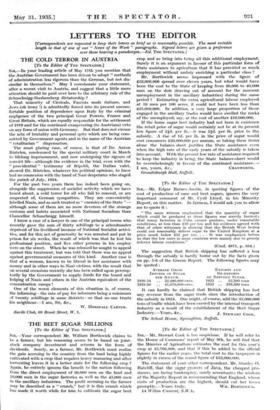THE BEET SUGAR MILLIONS [To the Editor of THE SPECTATOR.]
Sin,—Your correspondent Mr. William Borthwick claims to be a farmer, but his reasoning seems to be based on joint- stock company investment and returns in the form of dividends. Surely, as a farmer, Mr. Borthwick must realize the gain accruing to the country from the land being highly cultivated with a crop that requires heavy manuring and after harvesting leaves it in a better state for the following crop ? Again, he entirely ignores the benefit to the nation following from the direct employment of 30,000 men on the land and 10,000 men in the sugar factories as well as the 45,000 men in the ancillary industries. The profit accruing to the farmer may be described as a " crumb," but it is this crumb which has made it worth while for him to cultivate the sugar beet crop and so bring into being all this additional employment. Surely it is an argument in favour of this particular form of State assistance to agriculture that it has provided so much employment without unduly enriching a particular Mass ?
Mr. Borthwick seems impressed with the figure of £53,000,000 spread over eleven years, but what would have been the cost to the State of keeping from 20,000 to 40,000 men on the dole (leaving out of account for the moment unemployment in the ancillary industries) during the same period ? Estimating the extra agricultural labour employed at 10 men per 100 acres, it could not have been less than £25,000,000. In addition, a very large proportion of those engaged in the ancillary trades would have swelled the ranks of the unemployed, say, at the cost of another £10,000,000.
If the home sugar beet industry had not been in existence the retail price of sugar would certainly not be at its present low figure of 2td. per lb.—it was 5d. per lb. prior to the subsidy. A rise of 1d. per lb. in the price of sugar would cost consumers £20,000,000 per annum, so taking these items alone the balance sheet justifies the State assistance even when the high rate of the early years of the subsidy is taken into account. With the present low rate of assistance required to keep the industry in being, the State balance-sheet would be overwhelmingly in favour of the continued assistance.— Grandisburgh Hall, Suffolk.


























































 Previous page
Previous page